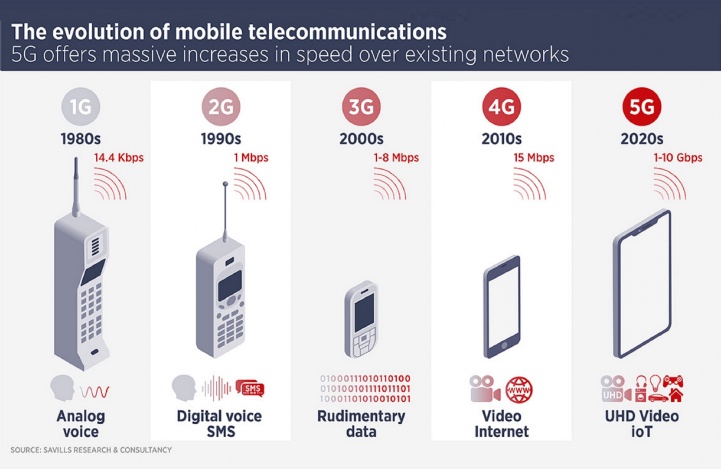The latest iteration of mobile telecommunication will lead to connections more than 100 times as fast as current 4G networks, which means users will be able to download a film in seconds.

Chris Marriott, chief executive for South East Asia at Savills, says: “5G speed and efficiency will be far greater than current networks and this will bring a number of practical advantages for building owners.
In Asia Pacific, South Korea had a head start on the rollout of 5G networks, launching in April, with three million citizens to switch to 5G by the end of this year, while some areas in Australia will have 5G later this year. Meanwhile, China, Japan, Singapore and Hong Kong will launch their 5G programmes next year.
A study by Intel found that 95% of senior figures in the technology business believe 5G will be one of the most important technologies over the next 50 years. Much of the technology which will take advantage of 5G has not yet been created, but there are already several ways 5G will affect real estate.
5G will need space
There is an infrastructure requirement for 5G which could benefit building owners, as 5G networks need more, smaller nodes. These could provide additional revenues for landlords. In order to improve data transfer, 5G networks will also require smaller data centres nearer to consumers, providing another potential revenue stream for owners of suitable properties.
Buildings will get smarter
One the most important applications for 5G will be the Internet of Things; for asset managers this means smarter building management systems with more data. Coupled with AI technology, this could mean substantial cost savings in the long term.
Marriott says: “5G will offer richer and more immediate data, which can be used to adjust heating and cooling, automate security and improve the performance of a building. In South East Asia, the cost of cooling commercial real estate is substantial, so improvements will be seen in the bottom line.”
Cities will get smarter
5G devices will be crucial to the development of smart cities, where big data is used for the efficient processing of traffic, waste, water and power. Sensors all over the city will be able to transmit real-time data for city management software.
5G will drive the driverless revolution
The data transfer capacity of 5G means driverless vehicles will be able to communicate with each other and with smart city networks more swiftly and take in more data in order to safely negotiate city streets. Future ‘car-lite’ cities will be revolutionary for real estate, as lower vehicle numbers will free up valuable space currently occupied by roads.


















